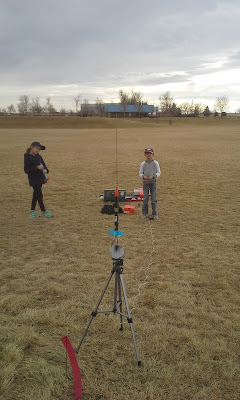My first launch session of 2018 took place on Friday of
the New Year week. Checks of local
weather and wind websites showed afternoon temperatures in the mid -50s and minimal
wind. Ideal. I was off from work for the whole week and my
two grandkids, ages 7 and 9, were still on winter break, so they came along to
fly their Generic E2X models.
Arriving at Dove Valley Park at 1 p.m., we found that the
temperature was at 56 degrees with high overcast, and NO wind whatsoever.

 The first model off the pad was the Hornet for flight
number 38. Once again, the bird
performed very well on an A3 engine, deploying its parachute and landing very
close by.
The first model off the pad was the Hornet for flight
number 38. Once again, the bird
performed very well on an A3 engine, deploying its parachute and landing very
close by.
This was followed by flights of the kids’ Generic E2X
rockets, all on A8-3 engines. The
grandson flew his once and his older sister flew hers twice. All performed flawlessly, and were recovered
very near to the launch pad. I was
really liking these calm conditions!

 Next, it was time to fly some gliders. The Griffin-2 and Firefly parasite were
prepped and placed on the pad. The
tandem lifted off nicely on B4-2 engine power, achieving a respectable
altitude. The Firefly detached
immediately at ejection and started a flat, straight glide toward the northwest. The model has no turn trimming whatsoever, so
I knew it would glide for a long distance.
It ended up flying out of the park boundary and landed in the median of
the adjacent street. I timed the glide
duration at 71 seconds. I definitely
need to work on further glide trimming to instill a turn in its flight pattern. As for the Griffin, it deployed its parachute
and landed softly very close to the launch pad.
Next, it was time to fly some gliders. The Griffin-2 and Firefly parasite were
prepped and placed on the pad. The
tandem lifted off nicely on B4-2 engine power, achieving a respectable
altitude. The Firefly detached
immediately at ejection and started a flat, straight glide toward the northwest. The model has no turn trimming whatsoever, so
I knew it would glide for a long distance.
It ended up flying out of the park boundary and landed in the median of
the adjacent street. I timed the glide
duration at 71 seconds. I definitely
need to work on further glide trimming to instill a turn in its flight pattern. As for the Griffin, it deployed its parachute
and landed softly very close to the launch pad.
Next up was the Mini-Maggot-3 boost glider. A 1/2A engine sent the model straight up to
altitude where glider separation occurred perfectly. Unlike the Firefly, this glider is trimmed to
describe about a 25’ diameter right hand circle. The MM3 circled gracefully straight over head
and landed about 30 feet from the launch pad after a 56 second flight
duration. If this glider ever catches a
thermal, I’m afraid it will be “Bye, Bye, Birdie!”
Failure analysis revealed that I had committed a dumb ‘rookie’
mistake. Forgot to powder a new
parachute….
Anyhow, it was time to pack up and head home, having
completed seven highly successful model rocket flights in absolutely ideal
flying weather.







No comments:
Post a Comment